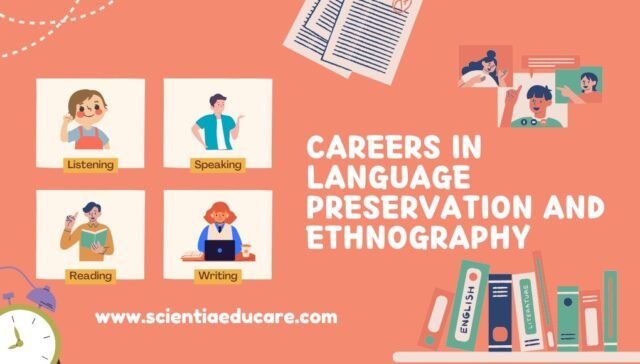Language preservation and ethnography are critical fields dedicated to documenting, analyzing, and revitalizing languages and cultures, especially those at risk of disappearing. Professionals in these areas work to maintain linguistic diversity and cultural heritage, contributing significantly to our understanding of human societies. This article explores career opportunities in language preservation and ethnography, highlights top academic programs, and provides resources for further exploration.
Careers in Language Preservation and Ethnography,
Careers in endangered language documentation,
Ethnographic research job opportunities,
Language revitalization project manager roles,
Linguistic anthropology career paths,
Jobs in cultural language preservation
Understanding Language Preservation and Ethnography
Language Preservation involves efforts to document, maintain, and revitalize languages, particularly those that are endangered. This includes creating dictionaries, recording oral histories, and developing educational materials to support language learning and usage within communities.
Ethnography is a qualitative research method used in anthropology and other social sciences to study cultures and societies through direct observation and participation. Ethnographers immerse themselves in communities to understand social practices, beliefs, and interactions from an insider’s perspective.
Career Opportunities in Language Preservation and Ethnography
A variety of career paths are available for individuals interested in language preservation and ethnography. These roles are found in academic institutions, government agencies, non-profit organizations, and private sectors worldwide.
Academic Careers
Linguistic Anthropologist
Linguistic anthropologists study the relationship between language and culture. They conduct fieldwork, teach at universities, and publish research on language use, evolution, and its role in society.
Ethnographer
Ethnographers conduct in-depth studies of cultures and communities, often through participant observation and interviews. They may work in academic settings, contributing to scholarly research and teaching.
Government and Non-Profit Roles
Language Preservation Specialist
These professionals work with government agencies or non-profit organizations to develop and implement programs aimed at documenting and revitalizing endangered languages. This may involve creating educational resources, conducting workshops, and collaborating with indigenous communities.
Cultural Resource Manager
Cultural resource managers oversee the preservation of cultural heritage, including languages, artifacts, and traditions. They may work for governmental bodies, museums, or heritage organizations, ensuring compliance with preservation laws and promoting cultural awareness.
Private Sector and Applied Roles
User Experience (UX) Researcher
Ethnographic methods are valuable in UX research, where understanding user behavior and cultural contexts can inform product design and development. UX researchers conduct field studies, interviews, and usability testing to gather insights.
Corporate Anthropologist
Some businesses employ anthropologists to study organizational culture, consumer behavior, and market trends. These professionals apply ethnographic techniques to provide insights that can improve business strategies and practices.
Top Universities Offering Programs in Language Preservation and Ethnography
Pursuing a career in these fields often requires specialized education. Below are some leading institutions offering relevant programs:
1. University of Hawai’i at Mānoa
The University of Hawai’i offers a robust program in language documentation and conservation, focusing on the languages of the Pacific and Asia.
2. San Francisco State University
SFSU provides a Certificate in Ethnography, offering theoretical and practical training in ethnographic fieldwork applicable across various disciplines.
3. National Dong Hwa University, Taiwan
The College of Indigenous Studies at NDHU is dedicated to indigenous language preservation and cultural studies, offering programs that integrate ethnography and language documentation.
4. Indiana University Bloomington
Indiana University offers comprehensive programs in language and culture, preparing students for careers in anthropology, linguistics, and related fields.
5. University of Minnesota
The University of Minnesota provides pathways for students interested in language preservation and revitalization, including courses in field methods and sociolinguistics.
Job Prospects and Resources
Exploring job opportunities in language preservation and ethnography can be facilitated through various platforms:
-
Living Tongues Institute for Endangered Languages: Offers careers and internships focused on language documentation and revitalization.
-
Society for Linguistic Anthropology: Provides information on programs and career resources in linguistic anthropology.
-
Indeed: Lists ethnographic research positions across different sectors.
Further Reading and Resources
For those interested in delving deeper into language preservation and ethnography, the following resources offer valuable insights:
-
SIL International: Provides training and resources in language and culture documentation.
-
American Institute for Conservation: Offers information on graduate programs and careers in conservation, including cultural heritage preservation.
-
GoAbroad.com: Features articles on anthropology study abroad programs, which can provide practical experience in ethnographic methods.
Pursuing a career in language preservation and ethnography is both rewarding and impactful, contributing to the safeguarding of linguistic and cultural diversity worldwide. With the right education and dedication, professionals in these fields play a crucial role in understanding and preserving the rich tapestry of human societies.














